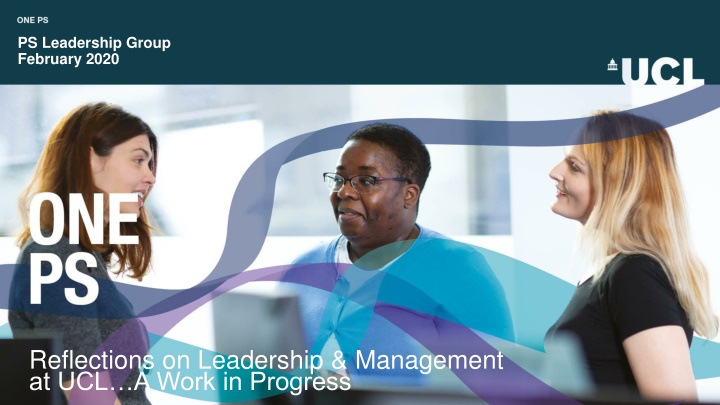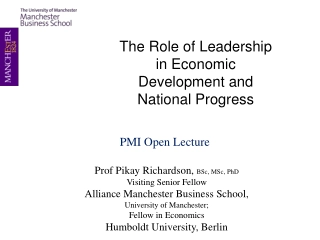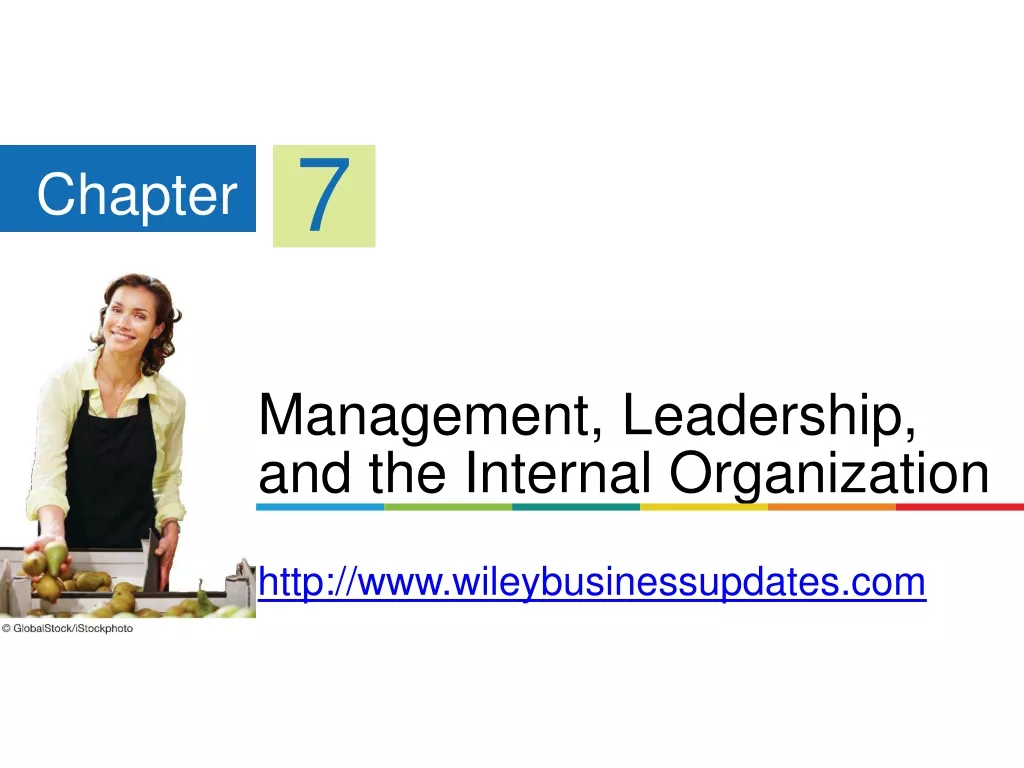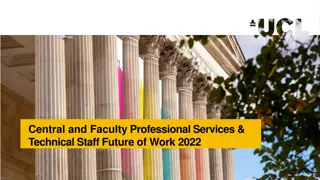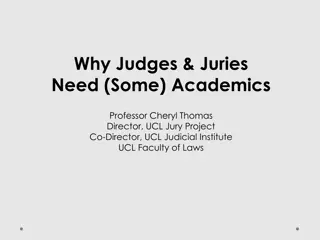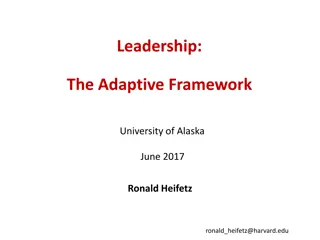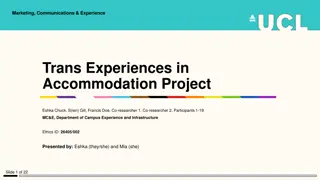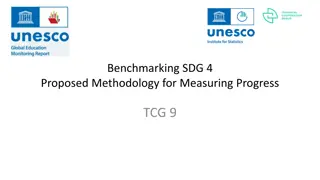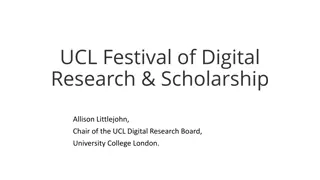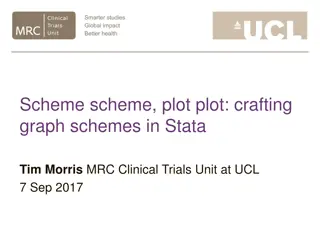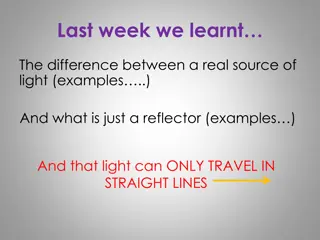Reflections on Leadership and Management at UCL: A Work in Progress
In February 2020, the PS Leadership Group at UCL held a meeting focusing on shared challenges and the importance of collaboration among departments and VP offices. Attendees were encouraged to share ideas for developing leadership behaviors and accessing online resources for staff development. Discussions included the need for accessible support for line managers, promoting internal talent growth, and utilizing Career Pathways for career development. Overall, the session emphasized the value of teamwork and continuous improvement in leadership and management practices at UCL.
Download Presentation

Please find below an Image/Link to download the presentation.
The content on the website is provided AS IS for your information and personal use only. It may not be sold, licensed, or shared on other websites without obtaining consent from the author.If you encounter any issues during the download, it is possible that the publisher has removed the file from their server.
You are allowed to download the files provided on this website for personal or commercial use, subject to the condition that they are used lawfully. All files are the property of their respective owners.
The content on the website is provided AS IS for your information and personal use only. It may not be sold, licensed, or shared on other websites without obtaining consent from the author.
E N D
Presentation Transcript
PS Leadership Group February 2020 Reflections on Leadership & Management at UCL A Work in Progress
Summary Thank you for attending PSLG s February meeting, and for throwing yourself into the session. Your responses only reaffirm my belief that we will solve our shared challenges, quicker together. It is vital that we - the centre, departments and VP offices work closely together. This document will be stored on the Ways of Working website, I encourage you to share your ideas to develop this pack further, by emailing OnePS@ucl.ac.uk. Please use, share and bring this document to life. Fiona Ryland, UCL Chief Operating Officer
Useful online resources, all in one place A Work in Progress talks about multiple online resources which have been included below for ease: Welcome to UCL, all new staff should be signed up to an event. Lunch and Learn, an example of the sessions available on a range of projects. Communities of Practice, encourage your staff to join a community. Career Pathways, a fantastic resource aimed at supporting fulfilling careers. Ways of Working, leadership behaviours at all levels. Mandatory Learning, encourage staff in their first week to spend time on this. A broad range of learning and development opportunities available vie the Learning and Development portfolio Management Development Leadership Enhancement
Chapter 1, Working Together - Shared learning - Collaboration - Communication
Chapter 1: Shared Learning Title: Work in Progress What s the challenge/opportunity? Ensuring that accessible support is available for line managers, to support effective communication finding time for team being consistent What advice can we offer? Making managers aware of the tools that are available and encouraging them to use it, and speak to their line manager about it. Develop some more relevant training for managers to access that supports a cultural shift and behaviour change. Share and encourage effective ways of managing, such as one to ones, team meetings/huddles, team building activities, and support in delivering an effective appraisal.
Chapter 1: Shared Learning Title: Grow your own What s the challenge/opportunity? Often at UCL we often will focus our attention on external individuals and do not take enough time to grow and develop our people for the future. This leads to talent leaving UCL to find their next opportunity, and UCL spending significant amounts of resource on external search. What advice can we offer? We have created the Career Pathways which provide career support for a range of colleagues, new starters and those who have been at UCL for multiple years. Future work should consider how we focus and develop this work across a range of services. Career Pathways have been launched for CAM, and we will shortly go live with HR, Projects, HR, Data & Insight, Operations Management and Information Technology. Further work is needed to target training resource/budget to develop, support and grow UCL people. Colleagues in Organisational Development (OD) have started to consider talent at UCL.
Chapter 1: Shared Learning Title: Making a Difference @ UCL What s the challenge/opportunity? While the UCL-side Welcome to UCL staff induction event has recently been expanded and improved, the quality of local inductions for new joiners is inconsistent across UCL, and it takes longer than planned for those staff to learn the necessary skills and knowledge. Inductions are being provided by colleagues with a lack of training and knowledge on the job role. What advice can we offer? The training and development opportunities provided as part of the induction process should be encouraged, with a focus on Mandatory online courses Lunch & Learn opportunities Invitation to a Community of Practice This should also be offered, periodically, to staff as a refresher, with a focus on managers.
Shared Learning Title: You ve got (too much) Mail What s the challenge/opportunity? UCL is too heavily reliant on the use of emails to communicate. We have started to address this with our Think Out of the Inbox campaign, with revised UCL email etiquette now being introduced. Challenges still include emailing people in the same room, using email to discuss ideas (better discussed in person) copying in too many people and filling up mailboxes What advice can we offer? We should encourage discussions about other methods to communicate with each other develop our culture, to be more trusting, so that decisions can be verbal and still be progressed use Microsoft Teams, it is available across UCL and has been received positively. continue to discuss and work on think outside the inbox as a tool to talk about changing behaviours and culture encourage current UCL staff to lead from the front, especially when communicating with new starters. review the email etiquette on the One PS webpage.
Chapter 2: Collaboration Title: Heroes and Celebrations What s the challenge/opportunity? Professional Services staff do not always feel valued in some parts of UCL, and we lack focus and tools to support the retention and development of staff. What advice can we offer? Colleagues noted that we need to balance our approach, with expectations managed so as not to promise everyone everything . The use of reward & recognition (not all financial) and performance management needs to be considered to provide a positive employee experience. Teams across UCL provide a range of tools, such as Kudos Cards used to note an achievement, where somebody deserves kudos Thank you cards given to staff for going above and beyond We should use the above to support progression and development in a balanced way.
Chapter 2: Collaboration Title: Silos are for grains, not people Title: One UCL (ish) What s the challenge/opportunity? We need to stop working in silos and work together to solve our collective problems. Faceless communication does not help our silo working, as it only reinforces who these messages come from. What advice can we offer? Teams have identified members of the team to be visible on portfolios of work, such as TOPS or sustainability and to provide coordinated updates to the broader team. Email signatures should include contact me for which outlines 3 areas and objectives that you can contact this person for. Individual contact me for should be shared on UCL directory. A new starters induction should be broad and include colleagues from across UCL, not just your team or faculty. A range of comms channels to be made available from across UCL.
Chapter 2: Collaboration Title: Those magnificent meetings for fulfilling our dreams (they go up tiddly up up, not down tiddly down down What s the challenge/opportunity? UCL meetings can be ineffective and unproductive. What advice can we offer? Meetings should have a set of clear objectives, which are shared well in advance of a meeting. If these objectives do not exist, people should be encouraged to decline. After each meeting the organiser (or nominated person) should always circulate a summary of, 5 action points and decisions. Microsoft Teams should be encouraged to stop significant travel across campus. Teams is easy to use and support is available online.
Chapter 2: Collaboration Title: Don t we ve always done it this way What s the challenge/opportunity? How do we embed meaningful change across UCL, and all teams. We often hear don t we ve always done it this way when trying to suggest new ideas and ways of working. What advice can we offer? Projects and new initiatives should consider the best way into a team to instigate change, considering that UCL is large and complex. The appraisal process and developmental conversations can be used to provide clarity of a member of staff objectives and ensure that they are supported with training and development. Including in the appraisal process can also provide a future opportunity for staff to raise with you in the future. SMT should be encouraged to lead from the front and embrace change.
Chapter 3: Communication Title: Stuck in the mud (about) sickness What s the challenge/opportunity? Longer term complex sick leave can have a significant impact on the line manager, and the team. Line managers can struggle to balance the team and individual staff wellbeing, as it is hard to be prescriptive about each case. What advice can we offer? Line managers should use policies available to them, and are encouraged to record the facts, such as dates of leave/absence. UCL has a range of tools available to support, such as Workplace health, Care First, Digital Accessibility Technologists, and HR Business Partners. Line managers should keep talking to individuals and teams involved, handling each case with sensitivity and confidentiality.
Chapter 3: Communication Title: The good, the bad & the tricky Title: We don t make a drama out of a crisis What s the challenge/opportunity? As you progress in line management at UCL, how do you approach the more complex line management/HR issues? How to have difficult conversations? What advice can we offer? We should read the policies available, which are helpful, and follow them don t panic talk to your HR Business Partner, and your line manager for support and guidance develop a safe space for sharing, like attending PSLG! remember you are not the first to deal with a majority of issues, and support is available put your best empathy foot forward, be responsible, proactive and sensitive to each case use the appraisal process to provide clarity for team objectives provide opportunities for your team to communicate attend training through the L&D portfolio.
Chapter 2, Achieving our Mission - Ownership - Vision - Innovative Practice
Chapter 4: Ownership Title: Take Ctrl (Control) Title: Don t stop me now! What s the challenge/opportunity? There are a large number of perceived blocks to decision making at UCL. Our people do not feel empowered and staff at all grades should feel comfortable to challenge the status quo. What advice can we offer? A Strategic Decision Making Framework is currently being created to support decision making at UCL. This will initially be tested in Estates and ISD projects but has been created for the eventual roll out across UCL. This will not help all decisions but is a good place to start. Line managers should encourage their people to consider risk and make decisions. We need to move to a more agile culture where we work at pace and improve/develop as we go. This should flow through a staff members employment experience, and be led by senior colleagues. Technology could be used in your teams to provide a space for online feedback and suggestions. CAM use Office Vibe which has made a real impact to how staff are feeling about being heard.
Chapter 5: Vision Title: The untitled work of UCL What s the challenge/opportunity? We have a real opportunity to heal the rift between faculties and the centre. What advice can we offer? One PS encourages people to work together. Teams should consider the broader expertise that is available across UCL, and that on most occasions it is available to you. Colleagues are keen to help. When working with other parts of UCL you should consider the impact your request will have on them don t send a department something BIG at the start of October! Encourage your team to attend events such as PSLG to talk to and hear from colleagues.
Chapter 5: Vision Title: Making Inclusion Work What s the challenge/opportunity? We have an opportunity to help all people reach their potential, by being aware of cultural differences and encouraging involvement. What advice can we offer? The introduction of the new recruitment system (in 2020) provides us with a significant opportunity to get it right and provide a modern and fair system. Secondments and assignments should be used to provide internal UCL people with opportunities to learn new skills and develop in a timely and efficient way. You should consider the use of mentoring and coaching in your team, and provide safe spaces for teams to talk about cultural awareness.
Chapter 6: Innovative Practices Title: Leading with less What s the challenge/opportunity? How do you manage with limited resources? What advice can we offer? Keep the hope alive within your team, working hard to ensure that they remain committed to the broader objectives of the team and UCL Do the small stuff, while campaigning on the BIG stuff. It might seems small but flexible working, free fruit, and a thank you now and then go along way. We need to set realistic expectations and empower each other to make a difference Prove that, their line manager, cares and that others care across UCL
Chapter 6: Innovative Practices Title: Work SMART Work FLUID Title: We will not meet again What s the challenge/opportunity? We need to reduce the amount of meetings, giving the time back to managers to focus on teams. What advice can we offer? A simple guide to effective meetings Is the meeting essential? What is the objective of the meeting? Is there a digital alternative? Can we ask others to attend, or delegate as part of a development discussion? At the end of each week, consider the question, was that meeting worth it? Remember to capture actions and decisions, and to follow them up.
Chapter 3, Personal Excellence Outstanding Service Integrity Commitment (No comment)
Chapter 7: Outstanding Service Title: I m a Manager, get me out of here! What s the challenge/opportunity? We have an opportunity to manage and challenge behaviour and attitudes across UCL, in an attempt to align to our values. What advice can we offer? This group talked about the following Effective recruitment, and encouraging colleagues to use the training available and to give recruitment processes your full focus. We need to use the Ways of Working in practice to address the current practices we find across UCL. We need colleagues to talk more and use networking opportunities to share and learn from one another.
Chapter 8: Integrity Title: Who wants to be a millionaire What s the challenge/opportunity? We have an opportunity to focus on our line managers as a group, providing them with continuous challenge, growth and development opportunities and take on UCL s very own who wants to be a millionaire . What advice can we offer? We offer each contestant (who wants to be a millionaire style) Phone a friend by talking to your HR Business Partner 50/50 by trusting yourself to make the right decision (with a little help) Ask the audience encourage your people to network and get out and about
Chapter 8: Integrity Title: Waving not drowning What s the challenge/opportunity? It was felt that staff at UCL do not request help when they need it we can do better. What advice can we offer? Groups talked about the practical tools available that they use including: Weekly team meetings An open door policy Collective objectives Honest conversations Creating a culture of trust and faith in your line manager and team
Created by the Professional Services Leadership Group February 2020 Email OnePS@ucl.ac.uk to share your feedback and help develop this pack.
